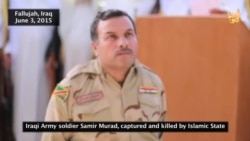Late last month, the Iraqi military told Samir Murad’s family he was killed in battle with the Islamic State.
Murad, a Shi'ite Kurd with the national army, had been near Fallujah, trying to stop the advance of the Sunni extremists.
His distraught brother immediately set off for Baghdad from his home in Khanaqin near the Iranian border.
“There was no body,” Amir Murad said, recalling his attempts to find his brother. “They kept saying he was martyred, but there was no body.”
Samir Murad, 46, was, at that point, still alive. As Amir desperately sought news in the capital, Samir was being held prisoner by the Islamic State. One week later, in an IS spectacle, Samir Murad was shot and killed.
The militants posted a video of his death online, part of a propaganda piece showcasing Sunni tribal leaders in Fallujah pledging loyalty to the Islamic State – the same type of leaders the U.S. hopes to bring into its anti-IS fight.
The Sunni sheiks, first shown sipping bottled Turkish orange juice to celebrate the alliance, lined up to watch as masked gunmen brought Murad before them.
Wearing his army fatigues, he kept his head held high as he was forced to kneel.
A spokesman for the sheikhs read at length from a speech. The elders listened, some with rifles leaning against the paunch of their bellies.
Murad looked skyward, slowly opening and closing his eyes, as if to block out the scene.
The voice droned on; the minutes crawled by. There was a cutaway to the sheikhs chatting and smiling. As the video ended, Murad was lying on the ground, his head covered in blood.
His brother learned of his death on Facebook.
Back in Khanaqin, with no body to bury, family and friends held a memorial for Murad at a local mosque. His relatives said they will press charges against the Sunni tribal leaders who watched over his death. But with the sheikhs safely ensconced among their Islamic State allies, justice may be a long way off.





